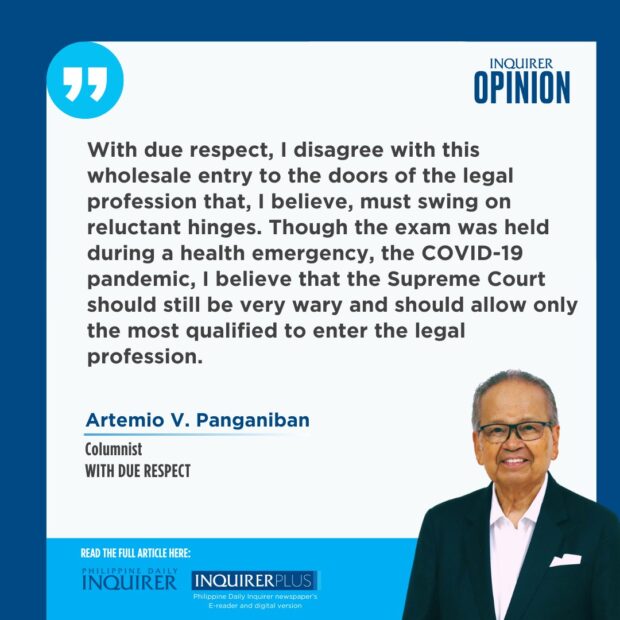The bar exam and the legends of the bar

The three-day 2024 Bar exam was finished yesterday, Sept. 15, while the first two were held on Sept. 8 and 11. Though 12,246 candidates applied, only 10,483 showed up on the first day. When I took the Bar exam in 1960, we were only 4,178, and 1,667 passed. It was held on four consecutive Sundays (instead of three days in just one week) and in only one location, the University of the East. Yearly, from 1965-1981, less than 2,000 took the exam. Now, more than five times did.
THE LOWEST PASSING RATE was recorded in 1999 at 16.59 percent with only 660 passers. An attempt to increase the percentage via the lowering of the passing grade from 75 to 74 percent was scuttled because of my strong objections (as an incumbent associate justice at the time) that rules should be obeyed and should not be changed midway. Moreover, the bar exam chair (who was an associate justice) was reprimanded and his honorarium as chair slashed by half by the Supreme Court, for failing to disclose that a nephew of his took the Bar exam, a disclosure that would have disqualified him from his chairship.
The most numerous examinees were in 2021 when 11,402 took the digitized and regionalized tests for the first time. 8,241 passed, the most in history, with a passing average of 72.28 percent that is also, to my recollection, the highest percentage of passing in history. Moreover, for the first time in history also, the top 10 passers were not named.
With due respect, I disagree with this wholesale entry to the doors of the legal profession that, I believe, must swing on reluctant hinges. Though the exam was held during a health emergency, the COVID-19 pandemic, I believe that the Supreme Court should still be very wary and should allow only the most qualified to enter the legal profession.
AFTER ALL, OUR PROFESSION IS THE FIRST KEY TO THE JUSTICE SYSTEM. Whenever our people encounter legal problems—and almost everyone does—the first experts available to help them are the bar exam passers. Lawyering is invested in the public interest, and lawyers are regarded and disciplined by the Supreme Court as public officers. Just because a few lawyers lie, people generalize the label to all.
Moreover, I also disagree with the nondisclosure of the top 10 passers. I am glad to note, however, that this practice has been abandoned in the last two years. Though by itself, topping the Bar exam is neither an assurance of success nor a guarantee of superlative legal know-how, still the top 10 passers become some of the greatest practitioners, professors, corporate counsels, and government officials. For this reason, they are sought after by the top law firms, the big conglomerates, and the government, and paid the highest compensation possible.
Notably, of the 27 chief justices of the Philippines (excluding Maria Lourdes Sereno who was ousted via quo warranto and deemed never to have been a de jure chief justice), at least 11 are bar placers: Jose Yulo (third), Ricardo Paras (second), Cesar Bengzon (second), Roberto Concepcion (first), Querube Makalintal (seventh), Ramon Aquino (ninth), Claudio Teehankee (first), Pedro Yap (first), Andres Narvasa (second), Artemio Panganiban (sixth), and Lucas Bersamin (ninth).
SINCE MY STUDENT DAYS, I have idealized three bar topnotchers: Jose W. Diokno, Jovito R. Salonga, and Claudio Teehankee. Diokno and Salonga tied for first place in the 1944 Bar exam with identical grades of 95.3 percent. Amazingly, Diokno did not finish law school. (He also topped the CPA board exam.) Salonga, a UP graduate, earned his Master of Laws at Harvard and his Doctor of Laws at Yale, a rare feat that only a few in the world have attained. Salonga was my mentor at Far Eastern University, my boss at his law firm, and my lifetime guru. He was in awe of only two lawyers, Diokno and Teehankee. Whenever either of them was on the opposite side, he would caution me as his then scrabbling assistant, “Please prepare our trial brief extra well because Pepe Diokno (or Dingdong Teehankee) is our opponent.”
Teehankee had impeccable academic credentials: summa cum laude in both his Bachelor of Arts and Bachelor of Laws from Ateneo de Manila, and numero uno in the 1940 Bar exam. Though he owed his appointment as secretary of justice and as an associate justice in the Supreme Court to President Ferdinand Marcos Sr., he remained independent and wrote (or concurred with) decisions unfavorable to him. In my humble view, he is the greatest Ateneo law alumnus of all time.
I tried, though unworthy, to emulate these three great masters. In emulation of Salonga who disbanded his law firm when he was named chair of the Presidential Commission on Good Government in 1986, I dissolved my own law firm (Panganiban, Parlade, Benitez, and Africa) upon my appointment to the Supreme Court in 1995. The dissolution orphaned my law partners, Dean Agustin Benitez (topnotcher in the 1959 Bar exam), Dean Custodio Parlade (fourth in the same exam), and my classmate Leopoldo Africa (11th in 1960) but they fully understood my action.
Please excuse my feeble attempts to imitate these legends of the bar as I humbly try, though undeserving, to live in the penumbra of their great shadows.
—————-
Comments to chiefjusticepanganiban@hotmail.com
















